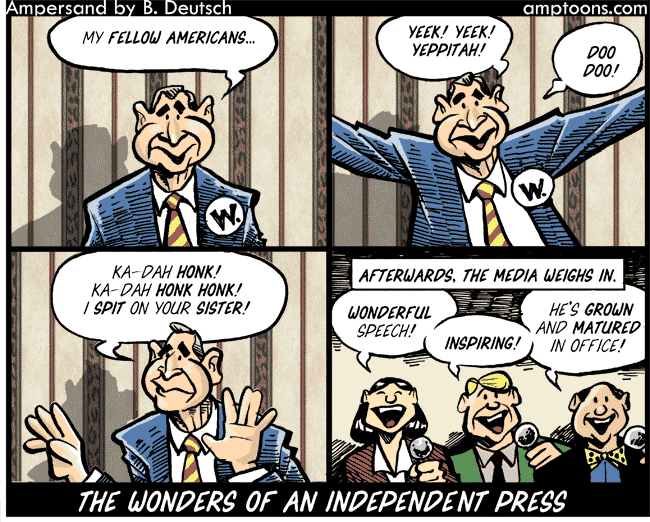Understanding Media - Solutions
CBSE Class–VII Social Science
NCERT Solutions
Political Science Chapter 6
Understanding Media
Q1: In what ways does the media play an important role in a democracy?
Ans: The media plays an important role in a democracy in the following ways:
- The media is considered as the fourth pillar of democracy as it is a watchdog of the government's way of functioning.
- The media provides news and help people to discuss important events taking place worldwide. We get to know how the other democracies are working worldwide. It is on the basis of this information that citizens can learn how the government works, and they can take actions on stories.
- They can do this by writing letters to the concerned minister, organising a public protest, starting a signature campaign, asking the government to rethink its programme etc.
- An independent media provides a balanced and reliable report on the incidents without any bias towards the government. A balanced report is one that discusses all points of view of a particular story and then leaves it to the readers to make their minds. So an independent media is important for a democracy.
- The Government controls the media in the name of censorship. By this certain news item cannot be shared with the public.
- Sometimes the media is even controlled by business houses which give a lot of money to the media for advertising their products.
- Media provides a platform for people to express their opinions, especially on national and international issues.
- If the media wants to increase public support for an issue, they often do this by focusing on one side of the story.
- The media brings social awareness about economic, political, social and cultural events.
Q2: Can you give this diagram a title? What do you understand about the link between media and big business from this diagram?
Ans: "Corporate Controlled Media" can be a suitable title for the diagram.
The diagram provides us with two interesting aspects:
- In order to promote their products, business houses place advertisements in various media like newspapers, TV, radio etc. These advertisements influence the readers or viewers to buy products. Thus, money invested by the big business houses in advertisements comes back to them by sale of their products. It also indicates products' advertisements increase the cost of the products. The business houses thus earn huge profits.
- Big corporates own TV channels, magazines and other media industries. They advertise their products through various media and influence people to buy their products. Since the business giants own the media houses, there are high chances of unfair reporting about their products. This may lead to customers making wrong buying decisions.
- Media's continual need for money and its links to advertising means that it becomes difficult for media to be reporting against people who are giving them advertisements.
- Media is thus no longer independent because of its close links with business.
Q3: You have read about the ways in which the media ‘sets the agenda’. What kind of effect does this have in a democracy? Provide two examples to support your point of view.
Ans: It is evident that media has an immense influence on the people by focusing on a few issues. This can have a negative effect on our democracy. The media also plays an important role in deciding what stories to focus on, and therefore, decides on what is newsworthy. Sometimes, it misses out on more significant events and covers unnecessary events that may attract people. Due to the significant influence it plays in our lives and in shaping our thoughts, it is commonly said that media sets the agenda. If the media focuses on one side of the issue, it can influence our thoughts and actions. People may make biased decisions. Rather, media should provide a balanced report and leave it to the audience to decide. A balanced report will help people in a democracy make the right informed decisions.
Examples:
- On a positive note, media highlighted social crimes under the name of "honour killing" by "caste panchayats" or narrow-minded families and communities. This helped people become aware of the social issue.
- India is the second most agriculture led country after USA. On a negative side, media (especially private channels) hardly broadcast programmes on agriculture to educate farmers. Rather these channels air "SaasBahu serials" 24 hours a day. Even news channels have dedicated shows to cover "Page 3 masala", but they hardly run any show on technical education.
- Is press really independent?

Q4: As a class project, decide to focus on a particular news topic and cut out stories from different newspapers on this. Also watch the coverage of this topic on TV news.
Compare two newspapers and write down the similarity and differences in their reports. It might help to ask the following questions–
- What information is this article providing?
- What information is it leaving out?
- From whose point of view is the article being written?
- Whose point of view is being left out and why?
Ans: Take two different newspapers. For example, "The Times of India" and "Hindustan Times". Go through both the papers of the same day. Choose any particular news heading in both the papers. Also watch the different TV Channels for this particular news heading, and answer the questions given with the help of newspaper cuttings and news watched on different TV channels. Try to find out which is more biased than the other and why?
